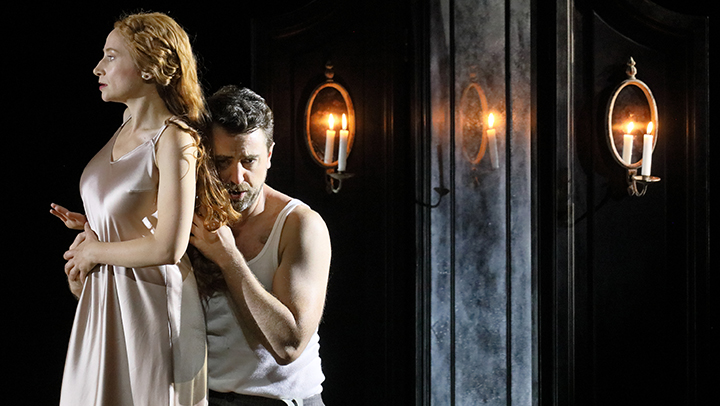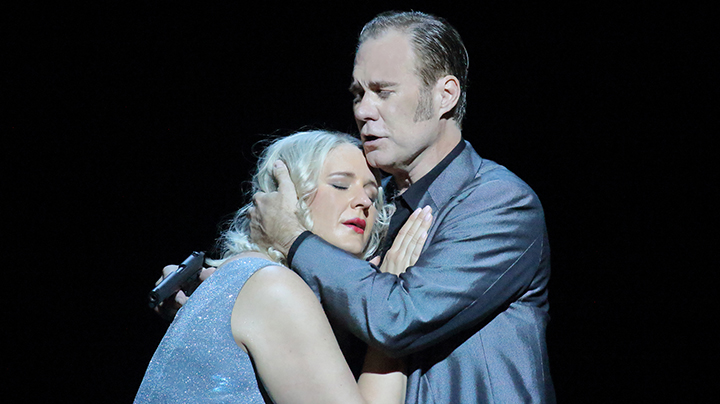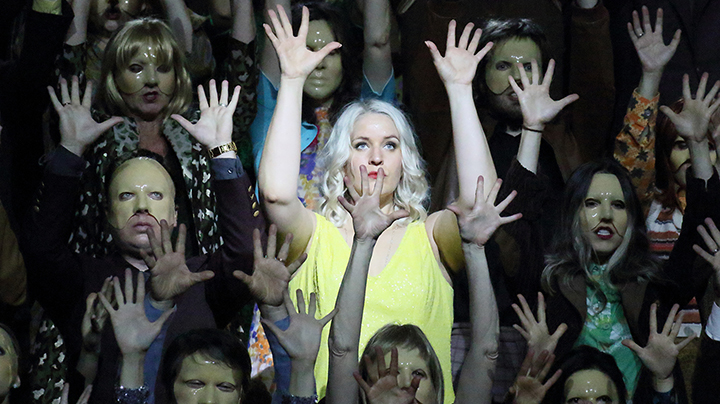The discreet attraction of the bourgeoisie

I check with Sabine Devieilhe and Lise Davidsen’s appearances on the Munich Opera Competition, the place they starred because the titular waif in Debussy’s Pelléas et Mélisande and Liza in Tchaikovsky’s Pique Dame, respectively. Devieilhe, a clarion coloratura, has confirmed peerless in her interpretations of the French Baroque repertoire, Romantic lieder, mélodie, and far in between. Her strategy to any repertoire is at all times idiomatic, and her pristine musicianship captivates. On the opposite facet of the vocal spectrum, Davidsen’s refulgent lyric dramatic soprano has made her as we speak’s main exponent of Strauss and Wagner. Her current appearances in New York have additionally allowed audiences to understand the depth of her artistry. These two artists possess vastly completely different devices, to make sure, however they each proved luminous presences throughout two darkly atmospheric productions.
Dutch director Jetske Mijnssen, making her Bayerische Staatsoper debut on this manufacturing on the extra intimate Prinzregentheater, moved Pelléas et Mélisande away from the medieval realm of Allemonde and right into a late-Victorian home setting. It’s virtually de rigeur amongst administrators to shift Pelléas to the time of composition—Graham Vick’s 1999 Glyndebourne manufacturing being a notable instance—however Mijnssen’s dynamic blocking together with Ariane Bliss’s intelligent dramaturgical interventions made the idea really feel recent.
Within the opening scene, Golaud finds himself not misplaced among the many boughs of an historic forest, however pacing round a sublime ballroom as {couples} waltz round him. He finds his footing, if just for a second, within the presence of an equally anxious Mélisande. Set designer Ben Baur’s stark preparations of Biedermeier furnishings upon parquet flooring supplant the decaying citadel halls of the next acts. A shallow trench of water alongside the stage’s edge stood in for the Blind Man’s Effectively, offering the characters with their sole technique of communing with the pure world amid their stifling bourgeois environment.
But regardless of forgoing the work’s fairytale facets, Mijnssen’s strategy retained a way of the faraway, the unreal encroaching upon what as soon as appeared stable and true. We watched as a collective erotic haze descended upon an already ailing household unit, difficult their inflexible notions of propriety and engendering, or maybe revealing, the violence amongst its ranks. It was uncooked, sensual, and unsettling—one of many strongest productions of an opera I’ve seen shortly. The manufacturing will seem at The Dallas Opera in November. Don’t hesitate to attend if you’re in a position.

Devielhe’s Mélisande was a surprise. Her voice had a gossamer really feel whereas its important brightness, which by no means veered into harshness, ensured that it might pierce by way of Hannu Lintu’s plush, if sometimes opaque, conducting. She usually eased into the notes, subtly constructing the depth of her vocal traces to exude an expansive high quality. Her “Mes longs cheveux descendent” had an unearthly aura, pouring into the corridor in a cascade of violet-hued sound. But, in step with the manufacturing’s extra grounded components, she infused a spirited willpower into her interpretation of the heroine. She sang with a confident abandon as she teetered on the properly’s edge, and her voice took on a barely steely edge as she confronted Golaud’s interrogation over her lacking wedding ceremony ring.
It’s laborious to imagine that Christian Gerhaher was as soon as a Pelléas, given how properly the position of the elder brother suited his full-bodied baritone. As Golaud, he gave probably the most dramatically compelling efficiency of the night, conveying a person riven by his rising paranoia and inclination in direction of rage. The scene during which he forces little Yniold, sung with poise by Tölzer Knabenchor member Henrik Brandstetter, to spy on the would-be lovers was unnerving, as every command he bellowed at his youngster chipped away at any semblance of decorum. His depth melted into pathetic self-loathing within the ultimate act, and he infused a tenderness into his pleas for forgiveness that stirred the viewers’s empathy.
Tenor Ben Bliss delivered a equally sturdy efficiency as he traced Pelléas’s arc from a good-natured if sometimes negligent lad to a person fully consumed by an obsessive ardour. His shiny, vigorous prime delivered some moments of sheer magnificence, although his decrease register usually bought misplaced amid the thicker orchestral passages. There was a substantial quantity of warmth in his interactions with Devielhe, particularly within the slightly voyeuristic rendering of the Tower Scene, and the 2 offered their characters’ bourgeoning attraction properly. Bass Franz-Josef Selig was commanding because the patriarch Arkel, whereas mezzo-soprano Sophie Koch introduced a matronly heat to Geneviève.

Pique Dame was extra of a blended bag. The manufacturing by Australian director Benedict Andrews, which premiered on the Staatsoper’s Nationaltheater final February, is ready in a nebulous modern setting: vaguely retro but forgoing any dalliances with Soviet-style aesthetics for generic cool. As an alternative, Andrews adopted the aesthetics of the uncanny to carry us into Herman’s expertise of alienation. The refrain emerged as an ominous, blank-faced entity from the again of the stage by way of John Clark’s smoky lighting to descend upon Herman, who was usually located by the prompter’s field. Throughout the ball scene in Act II, the refrain and most of the principal characters donned plastic masks that blurred their options as they robotically danced in unison amongst a set of bleachers. Herman’s fellow officers, Tsurin and Chekalinsky, performed with thuggish glee by bass Bálint Szabó and tenor Kevin Connors respectively, appeared hellbent on torturing their supposed good friend at each alternative, as have been the kids’s refrain within the opening scene and almost each different character aside from Liza. There have been additionally the standard directorial thrives: lengthy drags of cigarettes, strippers, doubles, moody projections between the scenes, and an assortment of autos rolling onto the stage.
If the manufacturing largely succeeded in its exploration of self-estrangement, it was largely as a result of presence of tenor Brandon Jovanovich as Herman, reprising the position from the winter run. His Herman appeared incapable of behaving usually; he staggered across the fringe of the stage, gangly and wild-eyed, brandishing his pistol within the viewers’s course. He usually mimicked the conduct of these round him, as when he mirrored the Countess as she caressed herself in her boudoir and contorted his face right into a painful, Looney Tunes grin amid the overall merriment on the ball.

His efforts to adapt merely exacerbated his isolation and drove him nearer to the brink. It was a deeply dedicated efficiency that introduced most of the manufacturing’s extra unique concepts into aid. Musically, he was much less constant. His tenor combines a mellifluous, clean tone with ample heft alongside his center vary, setting him aside from the darker voices which have tackled this notoriously tough position. But he approached most of the position’s punishing upward leaps with hesitancy, delaying his vocal manufacturing at occasions and leading to a number of cracks and an aborted excessive B on the finish of the primary scene. Nonetheless, he gained momentum because the night progressed.
As Liza, Davidsen was one of many few new additions to the manufacturing, changing Asmik Grigorian from the unique lineup. Probably as a consequence of an absence of rehearsal time, she was considerably ailing comfortable with the blocking, not fairly conveying the disaffected, moody heroine the manufacturing demanded. Nonetheless, her singing was beautiful all through. She scaled again her instrument considerably throughout her duet with Victoria Karkacheva’s plummy Polina, as the 2 girls’s voices rippled out and in of one another’s. Her Act III arioso “Akh! istomilas ya goryem” contained a variety of dynamic colours. Within the first half of the piece, she suspended her sound at a silver-cast mezzo piano earlier than sighing right into a diminuendo, imparting a slightly spectral air. Her excessive notes ignited her ultimate duet with Herman—the love story was maybe the weakest side of the manufacturing—and he or she left us with a coruscating F sharp that sliced by way of the orchestra.
Violeta Urmana appeared because the Countess in full 80s-era Elizabeth Taylor drag. Her mezzo-soprano retains a lot of its distinctive coloring, even when the sound just isn’t fairly as plush because it as soon as was. There was a decrepit sumptuousness to her Act II aria “Je crains de lui parler la nuit.” As Prince Yeletsky, Boris Pinkhasovich garnered probably the most enthusiastic applause of the night for his elegant and deeply felt “Ya vas lyublyu,” throughout which his mulberry shaded baritone unfurled some pretty legato traces and revealed a well-developed higher register. Baritone Roman Burdenko introduced a rakish vitality and an excellent dealing with of the textual content to Tomsky’s two arias. Natalie Lewis and Daria Proszek impressed of their temporary appearances because the Governess and Masha, respectively.
The wonderful high quality of a lot of the singing was undercut by conductor Aziz Shokhakimov’s lackluster efficiency within the pit, which noticed quite a few coordination points all through the night in addition to basic lack of shaping; the very wonderful Bayerische Staatsorchester sounded close to cacophonous at factors. The problems within the pit grew to become most obvious through the piece’s many choral sections, and he was unable to successfully sync the orchestra with the Refrain of the Bayerische Staatsoper. Solely within the a cappella ultimate prayer have been we in a position to recognize the richness of the refrain’s sound.
Images: Wilfried Hoesl

